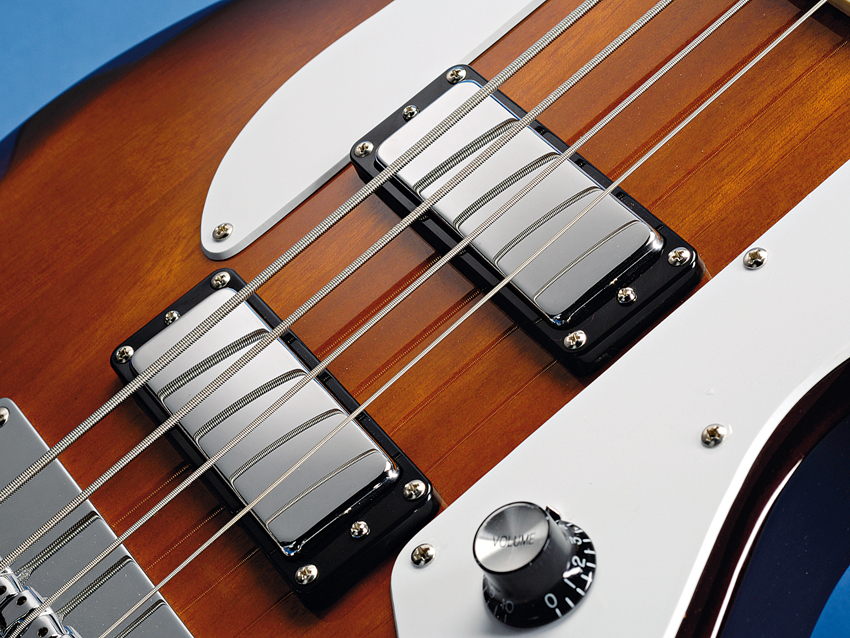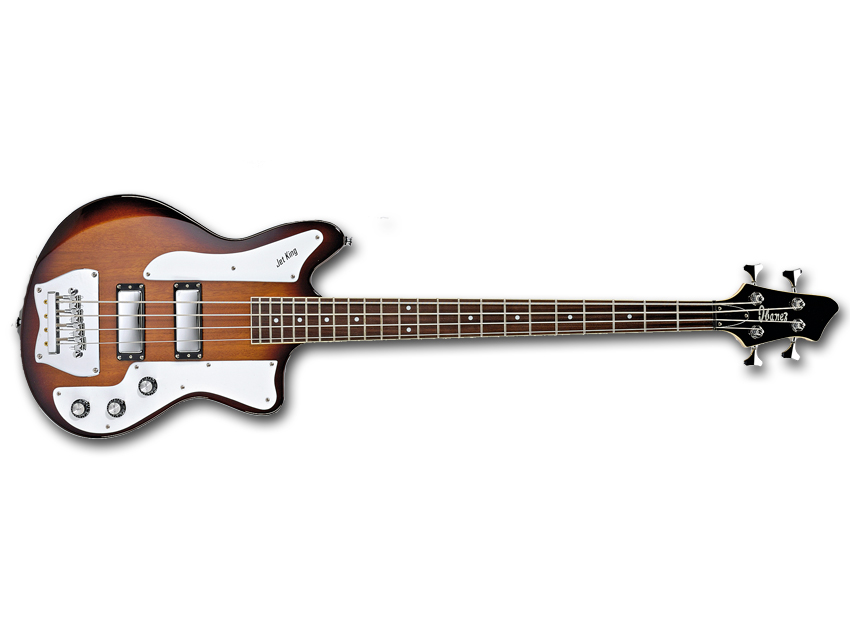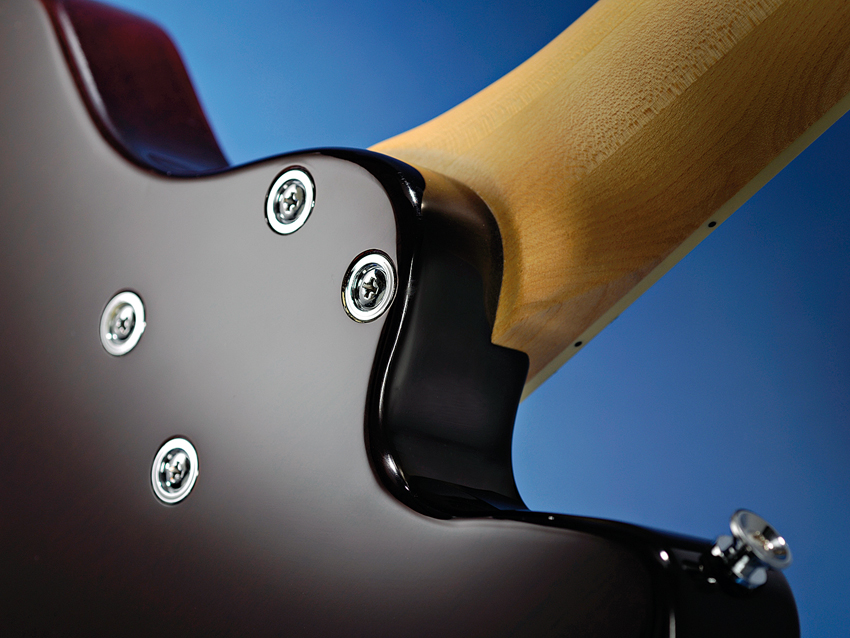MusicRadar Verdict
If you want something that looks vintage yet comes with modern build and playability advantages, this is definitely worth considering. At this price, can you really go wrong?
Pros
- +
Original yet retro design. Rich tonal delivery. Unusual blended sounds.
Cons
- -
Nothing at this price that the odd screw wouldn't fix.
MusicRadar's got your back

Ibanez JTKB200 Jet King bass

Ibanez JTKB200 Jet King bass

Ibanez JTKB200 Jet King bass
Although the current trend for new bass guitars seems to be one of active electronics, sleek body shapes with over-extended horns and an abundance of strings, there is still a healthy market for long established and classic designs from the past.
Ibanez is certainly one of the leading manufacturers of these production line hi-tech, hi-spec machines, but with the Jet King the company has taken a step or two back to offer a more modest and retro approach.
Here we see a return to their early days of, er, interesting shapes, passive electronics and an eye for the unusual. The Jet King is not so far removed from those early Gibson clones that got the company into trouble, and is fully packed with classic motifs that definitely draw on those chunky basses from the past.
"The bridge pickup allows the bass to grunt and growl with the best of them, but with a very distinctive slant."
Ibanez has already shown that it can produce great instruments when re-inventing these classic models (such as the excellent Iceman bass from the nineties), but this bass version of its JTK4 electric guitar reveals a less flamboyant appearance and a feel that actually sends you right back to the seventies.
It's a middle-ground approach that features minimalist cutaways to the slab body with a simple forearm chamfer to provide a little more comfort, a bound fretboard and a deep two-tone sunburst finish that serves to fully nail this retro look.
Nothing is left to chance here as all the individual features make their own bold visual statements - check out the two scratchplates, the huge bridge plate and the use of chrome covers over the single-coil pickups. However, the three controls sit neatly on the lower scratchplate and the jack socket is positioned on the body edge for a cleaner look and lower risk of damage when the instrument is plugged in.
All this helps to give the bass a very distinctive personality that can be felt as well as seen, as there are practical elements in the design here too. For instance, the bridge may have a large base plate but the active parts are relatively standard and very robustly made.
The individual saddles are kept neatly locked in line by a pair of hefty retaining pins that promise to withstand the attacking forces from even the most rigorous of pick players. However, with so much room to spare it's a pity that the ball ends of the strings remain exposed. There's good string spacing though, so lots of room to pull, pluck or slap as desired.
The neck is also generous in width and is well profiled to offer a positive grip and a feel that is much more Gibson than Fender. The fretboard extends beyond the neck joint and is squared off for a sharper look and to accommodate that top fret.
The upper scratchplate has no real practical purpose, as bass players rarely strum, but it does present further visual originality. However, that central screw looks more like an afterthought than a well-conceived placement.
The headstock is lightly back-tilted, so negates the use of a string tree, and thanks to its relatively small size and sealed gear tuners the instrument pleasingly provides the best playing experience possible from something with such a compact upper body horn. Very well done indeed.
Sounds
Hear it in action here. Bridge pickup:
Neck pickup:
Both together:
With an eye on this generally vintage design one would naturally assume a similar approach in the sound, and indeed the Jet King fully delivers this - with style.
Individual volume controls are the ideal choice here and the blending of these will provide the majority of the tonal variations available. The tone control itself sets the mood with a bias towards the bottom-end or the cleaner overtones but there are no extremes here, just a tight range of viable sounds.
The pickups may look like mini-humbuckers but they are actually very capable single-coil units. With one positioned centrally to the body and the other set towards the bridge the expectation is for a harder edge to the sound, with slightly less dynamic hollows, and this is pretty much the case.
Think of a good hard thud but with vastly improved note clarity and you'll be in the ballpark. This positioning also allows the mid-body pickup to grab the lion's share of the tonal value of the Jet King.
It's a pleasing sound too as it excels with warm and fruity characteristics and responds well to the naturally limited range provided by the single tone control and passive circuitry.
While the bridge pickup is mostly there to support this central unit it actually adds a great deal to the quality of the sound variations. It allows the bass to grunt and growl with the best of them, but with a very distinctive slant.
In fact the qualities of the overall sound are very much as individual as the presentation. While it undoubtedly has some tonal characteristics from the past, it manages to serve them up with a little more spice for a subtle variation that will provide appeal to a much broader taste.
Without doubt Ibanez has some very impressive bass endorsees on its books, yet the majority favour the company's more modern designs. However, for the rest of us, passive basses remain popular - there is an appeal to the full-on (if less dynamic) delivery of these old workhorses.
With that in mind this bass is ideally suited to the modern day root-note player where a big fat sound is all that really counts. It looks like a pretty standard instrument yet the Jet King bass is full of surprises.
With a unique voice, practical features and pseudo classic looks it offers a worthy addition to the immensely popular twin passive pickup range of basses. It has an air of authority that holds the eye and offers a playing experience that many bassists will find both attractive and comfortable.
It's certainly a tough little cookie, too, and that's what makes it great to take out on the road. So if you want something unusual but with a vintage sound and appearance, this is a very individual bass and at a very reasonable price. Modern jet-set it most certainly isn't, but it's a real king when it comes to good old-fashioned delivery and financial outlay.
“I called out to Mutt and said, ‘How about this?’... It was a complete fluke": How Def Leppard created a rock anthem - with a little bit of divine intervention
Baby Audio's Smooth Operator spectral balancing plugin goes pro
"It was ugly, like watching a divorce between four people. After a while, I had to get out": Beatles engineer Geoff Emerick on the recording of Abbey Road, track-by-track









